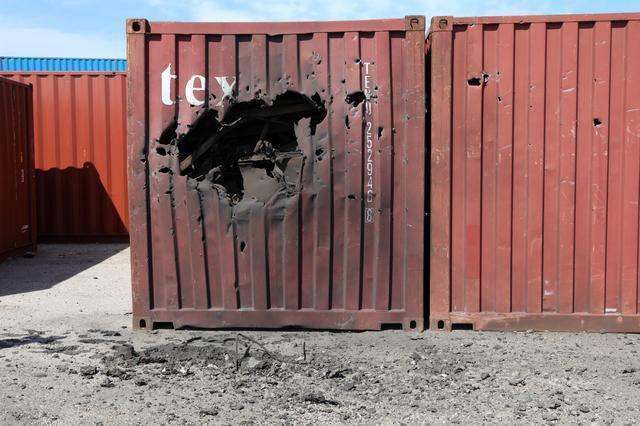Haftar's Libya a corrupt police state: Report
WASHINGTON-Anadolu Agency

A damaged container is seen at Tripoli port after an attack, Libya, on Feb. 19, 2020. (REUTERS Photo)
The regimented police state that renegade Libyan general Khalifa Haftar is attempting to build is both "more puritanical and more lawless than" that of the country's deposed longtime strongman Muammar Gaddafi, according to a recently published investigation.
A New York Times team found within Haftar's bastion of Benghazi "a half-ruined city beset by corruption, where security agents trailed foreign journalists, residents cowered in fear of arbitrary arrest and pro-government militias answered to no one."
That is due in no small part to the deals Haftar brokered that helped him secure the city from hardline groups, allying himself with tribal groups and extremist Salafists who "now threaten to run roughshod over his promises of secular law and order."
Salafi forces, the Times said, have destroyed historical shrines and lodges belonging to the Sufi order, a mystical branch of Islam, and clamped down on an Earth Day celebration, which they view as heretical.
The tribal forces, moreover, are suspected of carrying out extrajudicial killings, bombings and disappearances.
Haftar relied heavily on the Awaqir tribe, whose members "now boast of their impunity" in an era when they claim top government positions after being regarded as Haftar's "enforcers" during his campaign to seize Benghazi from hardline groups and in the time since it was captured.
The Avengers of Blood, an Awaqir militia, is suspected of involvement in last July's disappearance of politician Seham Sergiwa, who was abducted the night after publicly questioning Haftar's push to seize Tripoli from the U.N.-recognized Government of National Accord (GNA).
In addition to spray-painting a warning against criticizing Haftar's forces, the armed men wrote "Avengers of Blood" on her wall, according to the Times.
A spokesman for Haftar denied responsibility, telling the Times it was an act of terrorism.
















